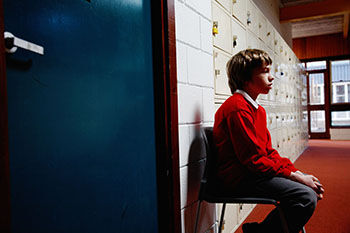University News Last updated 12 April 2019

Ahead of a government-ordered review into zero tolerance policies in schools, which is expected to be published before Easter, Dr Elizabeth Nassem, researcher at Birmingham City University and founder of Bullied Voices anti-bullying consultancy, argues that zero tolerance policies cause anger not reflection.
Zero tolerance policies cause anger not reflection
I have been required to follow zero tolerance policies to punish children in most of the schools I’ve taught in, as well as the majority of those that I’ve carried out research in.
Often, zero tolerance involves instilling a hierarchy of punishments to misbehaving children, for example first giving the child a warning, followed by a second warning and then detention. If detention didn’t improve behaviour, which often it did not, then the child could be placed in isolation. This involves placing children in small secluded booths sitting alone, segregated from other pupils for several days, and even weeks.
Victimisation
I’ve interviewed many school children in my anti-bullying research and asked whether they feel these zero tolerance punishments are effective or not. Most children felt they were not helpful and in fact, they cause more anger in children who feel unfairly ‘picked on’ by teachers or other children.
One child I interviewed reflected on his experience of zero tolerance forms of punishment commenting: “all the detentions I had, they were all piss taking bastards”. Once these children are identified as misbehaving, they become increasingly targeted and subject to a vicious cycle of punishments. The victimisation that these children feel can lead to them becoming increasingly resentful and hostile towards their teachers and other pupils, which in turn can further marginalise them and increase their engagement in bullying.
Children with learning disabilities targeted, others overlooked
Worryingly, my research has highlighted that zero tolerance policies are often targeted at working-class male children, particularly those who are from deprived backgrounds and have learning disabilities or special educational needs.
Meanwhile, other forms of unacceptable behaviour seem to be accepted, or even approved of, for example, humiliating and ostracising children who are struggling academically or not performing well in sport. It is astounding that this is happening in so many schools. Children may go on to learn how to discriminate against those with disabilities partly because of these practices they observe in school.
Damaging psychological and physical side-effects
There is no doubt that placing children in isolation booths can be seriously damaging to children’s mental health.
One pupil told me: ‘Can’t do isolation me, never done it, never can, I’ve always walked out of it, I can’t just sit there and look at a board, you always sit there… you don’t do shit, sit there for six hours, what’s point? I get migraines me; big migraines’.
“You learn how to be naughty like them”
Children who attend pupil referral units have often experienced extensive forms of punishments in school. Their attainment levels are usually much lower than those in mainstream school.
Where is the evidence that children who are subject to forms of punishment such as detention and isolation actually improve their behavior and learn how to respond more respectfully?
Children permanently excluded from school often feel they are segregated and stigmatised. Several children I interviewed in the PRU said they are in a “spaca school” and have little opportunities to improve their circumstances. Many children who are in pupil referral units feel their behaviour worsens when they are excluded, as one child commented that he was placed with all the “bad kids, and so you learn how to be naughty like them”.
Don’t isolate: offer mentoring instead
It is increasingly clear that isolation isn’t teaching misbehaving children the right lessons. A mentoring programme with the child provided by an educator is a much better alternative which helps children learn about the consequences of their actions and address underlying issues that may be causing the poor behaviour, rather than just punishing them when often they feel “picked on” and don’t understand what they have done wrong.
I have implemented mentoring programmes in schools for children whose behaviour is problematic for other pupils and school staff. This has involved taking children out of isolation and instead having regular dialogue with them about their behaviour. Mentoring has been successful in stopping mentees from engaging in bullying and they have developed more respectful ways of interacting with others.
Schools should review their policies and practices for dealing with unacceptable behaviour with their pupils and staff and find out from them what impact they are having and how they can be developed. It’s also important that schools work with parents to understand any underlying issues which could be contributing to the pupil’s problematic behaviour and use their input to help make more meaningful improvements.
Find out more about Dr Elizabeth Nassem’s research on the Birmingham City University website.